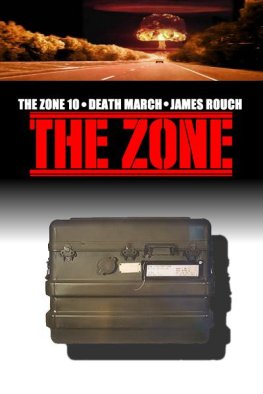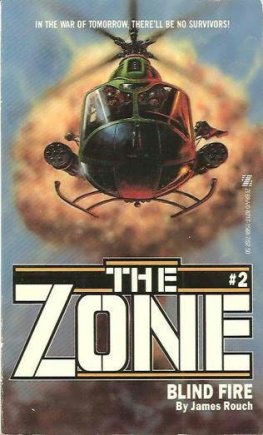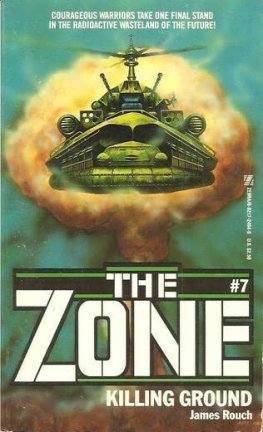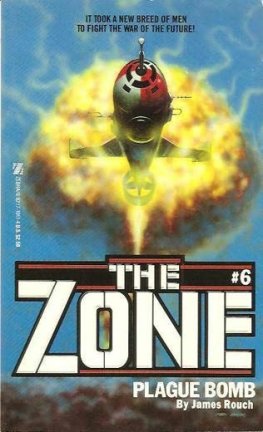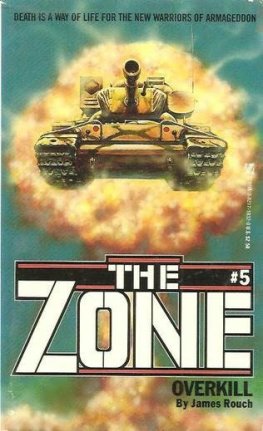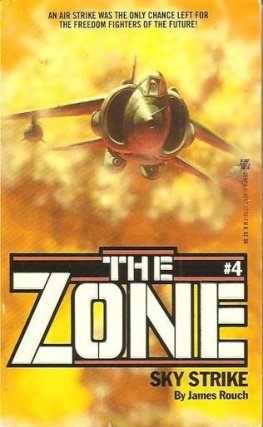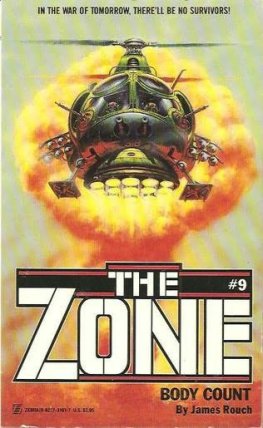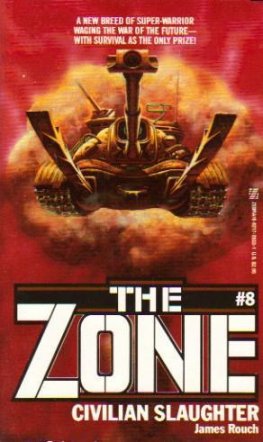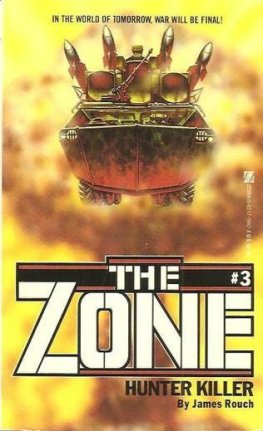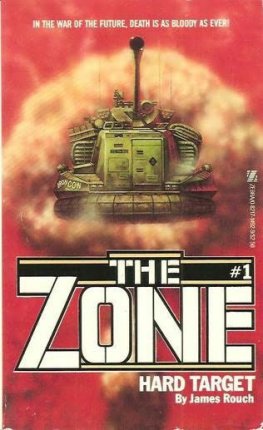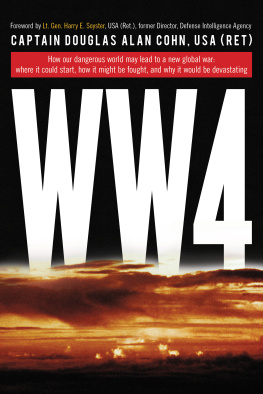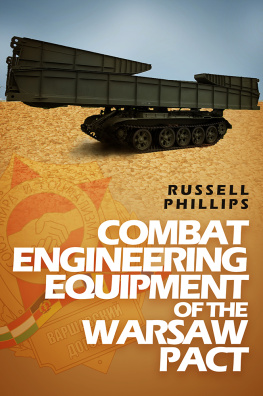James Rouch
DEATH MARCH

Cover illustration: Carrying case for the Mk-54 SADM 3AD Suitcase Bomb. The Mk-54 Special Atomic Demolition Munition (SADM) had a yield from .01 to 1.0 kiloton. The entire unit weighed less than 163 pounds. This weapon was in 3AD inventory with the US Army 23rd Engineers from 1964 into (apparently) the 1980s.
From Reuters. International News Agency.
To all news editors desks.
Europe, USA, Asia.
01.45 GMT. 25th March
NATO Command has today announced that it has stalled the Warsaw Pact advance in the area of Nurnberg, Bavaria. American and British troops are stabilising a defence line based on the River Main. Heavy fighting continues in the eastern suburbs of the city.
Russia has accused the NATO forces of employing five atomic demolition charges, resulting in the destruction of road and rail junctions. NATO High Command has responded by counter claiming that it is Soviet forces that have employed sub-kiloton weapons in attempting to clear a path through NATO roadblocks and rearguard positions.
If the latest reports are correct then that would indicate that the total of nuclear weapons employed within the Zone to date, including sub-kiloton neutron devices, has now reached one hundred Kilotons.
* * *
Positioning the device hardly called for precision. Its detonation was going to bring down the over-pass for at least a hundred yards. That combined with the cratering of the lower levels would block all main road approaches to the city from the east and southeast. It was likely the twin track rail line would also be severed, passing as it did close to the convoluted autobahn intersection.
The man worked fast, releasing the parachute straps first, and then those securing the bulky pack. It had been a clean drop, the light breeze enabling him to fall within his target circle. Grabbing up the bundle of material and the trailing cords he stuffed it beneath a nearby truck. Among the derelict vehicles of the salvage yard he worked fast, feeling the sweat pouring down inside his jump suit.
In the distance he could hear the fuel tanks of his transport exploding. The night sky reflected a fierce glow. The Soviet missile had struck the aircraft only moments after he had jumped; so close that one red-hot fragment had passed through his canopy. Luckily its heat had sealed the edges of the tear and it had not developed in to a threatening gash across the fabric. There had been no other canopies; his escort team had not made it out.
It was likely that enemy on the ground, their attention grabbed by the exploding aircraft, had seen him falling and would already be pushing patrols into the area. By the light of a small torch he quickly unfastened a panel set in to the top of the device within the pack and started to check some settings. Even as he did he heard a heavy vehicle approaching. The rough engine note and grinding of gears were evidence it was a Soviet wheeled armoured vehicle. A prowling scout car most likely. It stopped on the road outside the compound and a bright beam of light passed over the assembled civilian wrecks.
It swept back and though he hunched low over the pack he knew from the shouts he had been seen. There was no chance of running and certainly not of abandoning the pack and hiding. He knew he could not out run the enemy patrol and his training drove him to first finish his work on the packs contents. All he needed was another thirty seconds to activate the device. Then he would make a break for it. Hed have to cover half a kilometre and find hard cover. And that while doing his best to avoid capture. The odds were heavily against him. His hands moved across controls with long rehearsed skill. He was used to doing it in the dark, had done so before, many times.
A rifle shot echoed across the industrial area and a bullet kicked up a spurt of dust and tarmac at his side. Jumping to his feet he drew his Browning Hi-power automatic and went to snap off a shot towards the source of light. Before he could a long burst of automatic fire slashed from a silhouetted squat turret and hurling him backwards with its multiple impacts. The pack too was hit, toppling over and rolling on to its side in the oil saturated dirt. An inspection panel fell open. A dial hand rotated for a moment longer, then its clockwork mechanism jammed. A short row of glowing numbers blinked and went out.
The first thought of the Russian troops who approached the body and the pack was looting. Finding nothing on the blood soaked corpse, not so much as a scrap of paper, they spat and kicked at it, then turned their attention eagerly to the canvas wrapped object trailing strong straps. Roughly they hauled the heavy pack upright and ripped open its covering. Again they registered crude and noisy disgust that it was nothing of value.
The officer who sauntered to join them looked first in puzzlement at the solitary paratrooper, and then at the object he must have been carrying. Cautiously he lifted an inspection panel and took a long look in at it. The first few moments were just curiosity, those that followed, and in his mind seemed to stretch into forever, were not so casual. Fear rooted him momentarily, froze his voice, and took his breath. He saw the two close spaced bullet holes, saw the panel with the faint ghost of the figures barely visible in the darkness. He was turning, running, screaming all in the same instant as wild fear energised him.
Looking at their officer as though he was suddenly insane his troops watched him run to their transport, shouting orders to the driver even as he threw himself aboard. As the eight-wheeler began to move his panic communicated itself to them and they too started to run. Two of the men were crushed as the APC swept through a tyre scrubbing turn, riding over them without hesitation. Others clung to projections on the hull, their boots scrabbling to clear the thrashing deep treaded rubber.
In a moment the compound was empty, save for three bodies and the pack.
* * *
There were at least twenty Russian bodies in the field. Some had fallen facing forward, most had been hit as they turned and ran. Only a handful of wounded gave any sign of movement, flopping about in pain they could not cope with, or trying to crawl back to the drainage ditch.
You think theyll be coming a third time? Sergeant Hyde nestled deeper in to the shallow scrape beneath the thick hedgerow.
I was amazed they came a second, not after most turned and ran the first time. Major Revell handed two magazines to the NCO. Thats the last.
Hyde laid the replenishment neatly at his side, tapping each to ensure the spring hadnt jammed and the rounds would feed smoothly. He blew on the open end of the cold metal to remove any dust.
He looked back over his shoulder to the autobahn service centre where they had so successfully carried out their demolition task. The steel frame walkway across the multiple carriageways had collapsed and now completely blocked the route with tangles of twisted girders and shattered concrete beams. A fire was starting to sweep through a section of the wreckage. A fitful breeze was dispersing most of the smoke but constantly lifted clouds of ash and dust from the ruins.
In the distance a Soviet T72 recovery tank was trying to tow into the cover of a cutting a T80 battle tank that Revell had knocked out with their only anti-tank rocket. Dragging a broken track the disabled vehicle was crabbing across the road and enmeshing itself with the central crash barrier, resisting the forces being employed to move it.
How did the Major know to move forward just before that artillery barrage? Simmons worked while he spoke, deepening the hole in which he lay, tossing aside the earth, chopping through the tangled roots of the hawthorn. He worked automatically, speaking to Corporal Thorne while watching the officer and NCO conferring.

